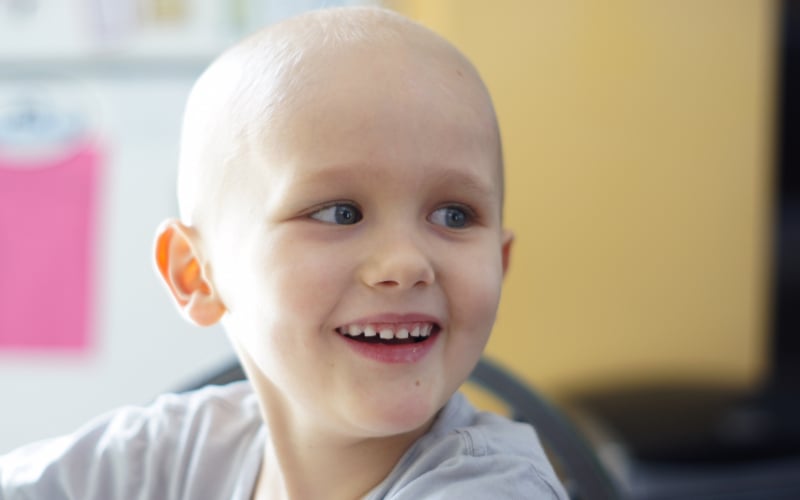
By: Trish Adkins
Children battling cancer not only face the health effects of the cancer itself, but they also face short- and long-term side effects. During treatment, typical therapies like chemotherapy and radiation can compromise a child’s immune system, putting them more at risk for illnesses like COVID-19.
Why is it important to protect children with cancer?
Treatments like chemotherapy, radiation, stem cell transplantation and other therapies can weaken the immune system. Chemotherapy drugs, in particular, damage or destroy the cells inside the bone marrow, lowering the number of white blood cells and other immune system cells circulating in the body. When the number of infection-fighting white blood cells is low, a child is in danger of developing serious infections and compromised at fighting those infections.
In addition, children in treatment for cancer often cannot receive routine vaccinations, which puts them at risk for other communicable diseases.
For children with bodies that are already recovering from cancer, the risk of illnesses is enormous.
What do I need to know to help kids with cancer?
There is so much unknown about COVID-19. As public health professionals and researchers work to find ways to treat and prevent COVID-19, it is up to us to remain aware and vigilant. The one thing we do know: if we all work together, we can protect the most vulnerable from COVID-19 and other cold and flu viruses.
Here’s what you need to know to protect children with cancer during cold, flu and COVID-19 season:
1. Wash Your Hands
The Centers for Disease Control recommends frequent hand washing to stop the spread of illness. For families in the midst of cancer treatment, the ALSF Childhood Cancer Guide series recommends frequent, lengthy (at least 1 to 2 minutes) and thorough hand washing for every member of the family, as well as for all visitors. Use plenty of soap and warm water, lather well, and rub all portions of the hands, including between all the fingers and under the fingernails. Children and parents need to wash before preparing meals, before eating, after playing outdoors, after petting an animal, and after using the bathroom. In addition, avoid touching your face or anyone’s face.
2. Social Distancing
Limiting large group interactions can also help slow the spread of viruses. Even if childhood cancer is not in your family or community, your vigilance and practice of social distancing could limit the spread of cold and flu viruses in your community.
3. Cancer Treatment is Not Always Visible
Keep in mind that cancer treatment and a suppressed immune system are not always visible. While cancer treatment is often visible, children in treatment don’t always look like they are in treatment. To you, they may just look like a typical kid. And their siblings certainly won’t look like they are being impacted by childhood cancer. Everyone should always be vigilant about hand washing, face touching and staying home when experiencing cold and flu symptoms.
4. Families May Still Have to Travel
Just because COVID-19 is circulating, that does not mean childhood cancer treatment stops. Families and children with cancer still have to get to treatment and critical follow-up oncology visits. They have to fly on planes to get to clinical trials and commute to urban hospitals for clinic visits. By taking precautions like hand washing and social distancing, you can help keep the world a little safer and hopefully lower the risk of virus transmission.
5. When in Doubt, Ask Your Healthcare Provider
Always, when in doubt, talk to and follow your healthcare provider’s guidelines. Ask your doctor if you are experiencing an illness and need to know whether you are a risk to your loved one battling cancer or if you are a parent of a child with cancer and want to understand more about how you can protect your child.
6. Respect a Family’s Wishes
The bottom line: we each have to listen to medical professionals and listen to each other. The most important thing you can do to protect children with cancer is to respect the wishes of their family and caregivers. If they do not want visitors, if they request no touching, require you to scrub in and wash up before entering their home—do it.
Alex’s Lemonade Stand Foundation is determined to find cures for childhood cancer and support children facing a cancer diagnosis. Amidst COVID-19 concerns, our heroes are among those most at risk if affected. We keep them in our hearts as we push forward with finding better and less toxic cures. If you want to directly support families affected by this disease, you can donate to ALSF's COVID-19 designated fund.
If you are a family looking to learn more about your child’s diagnosis and journey, check out The Childhood Cancer Guide series. The series includes five books and they are available on our website or in hardcopy here.
The Centers for Disease Control website has a set of guidelines around COVID-19.
Sign Up for the ALSF Newsletter
Learn about research, read Foundation stories, and find out how to get involved

